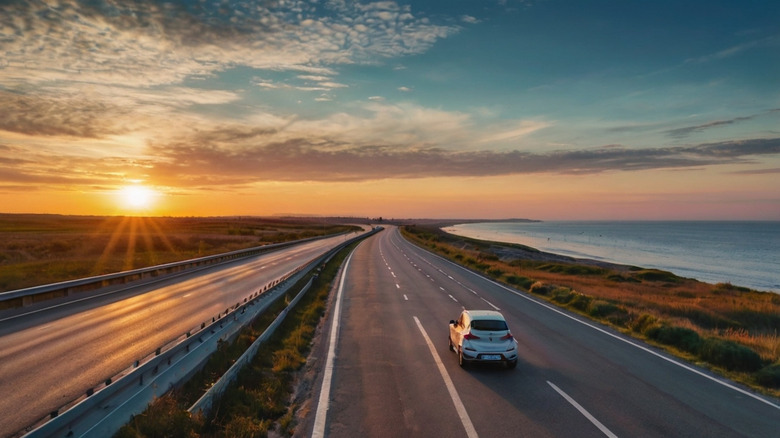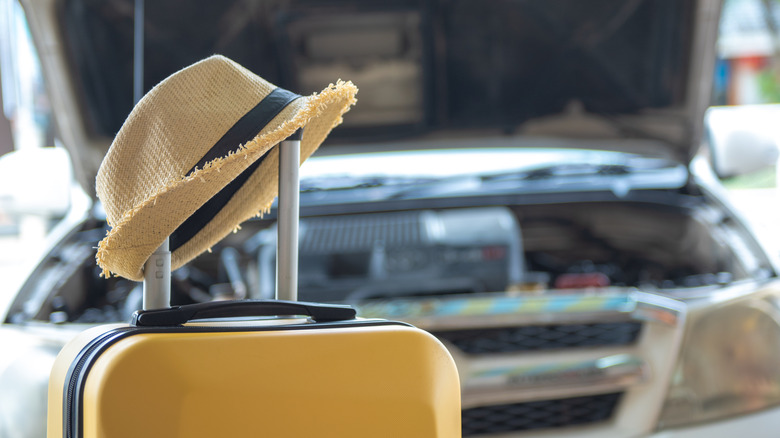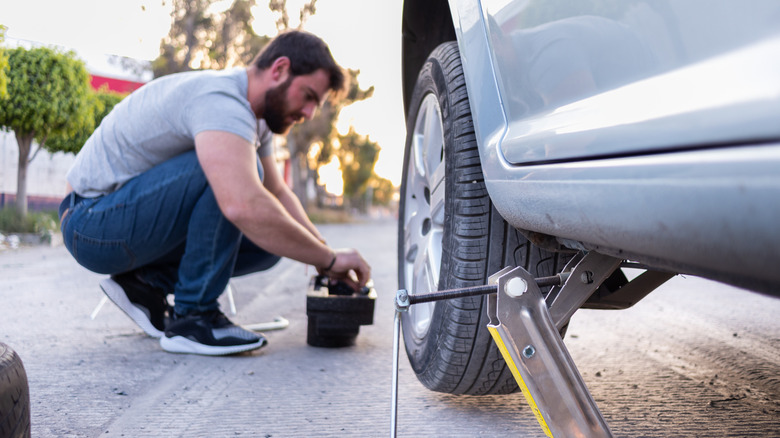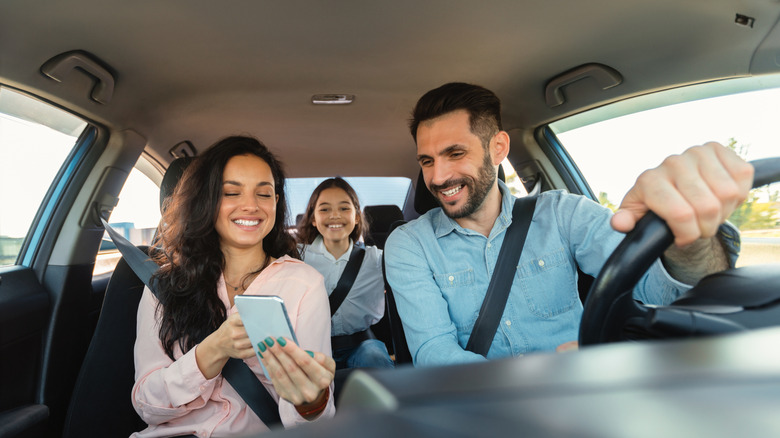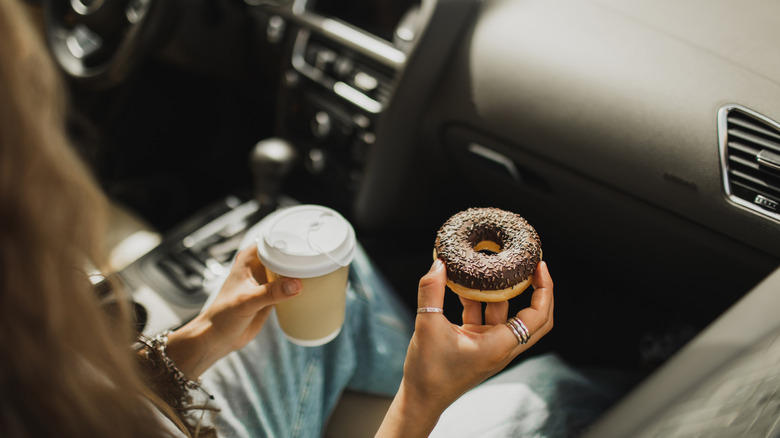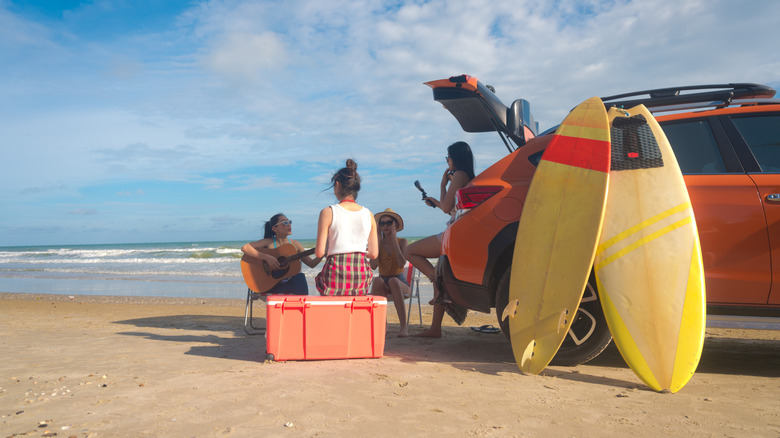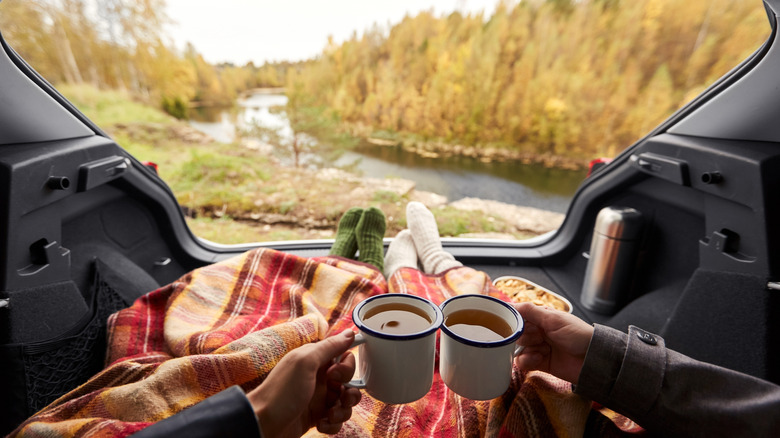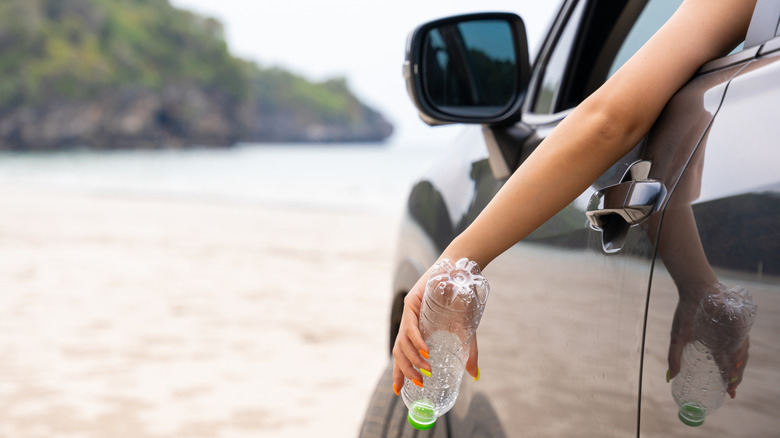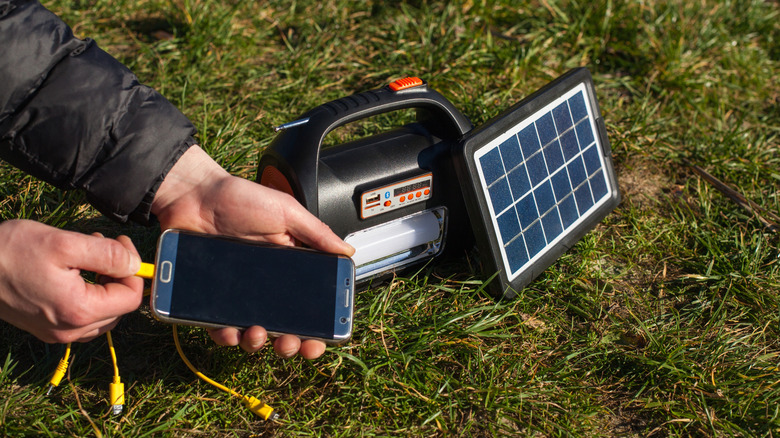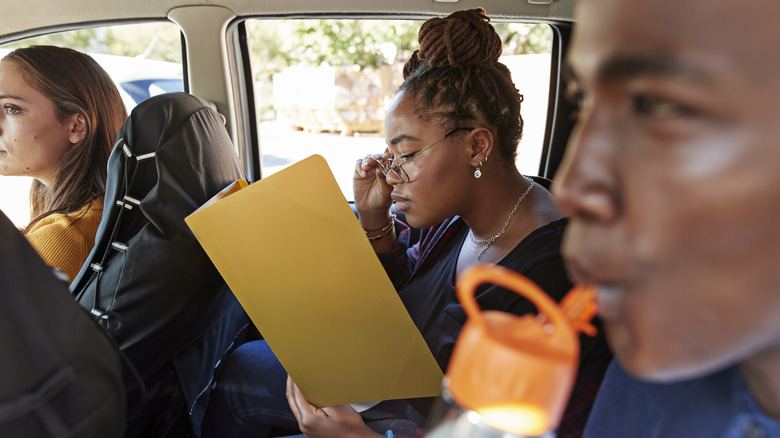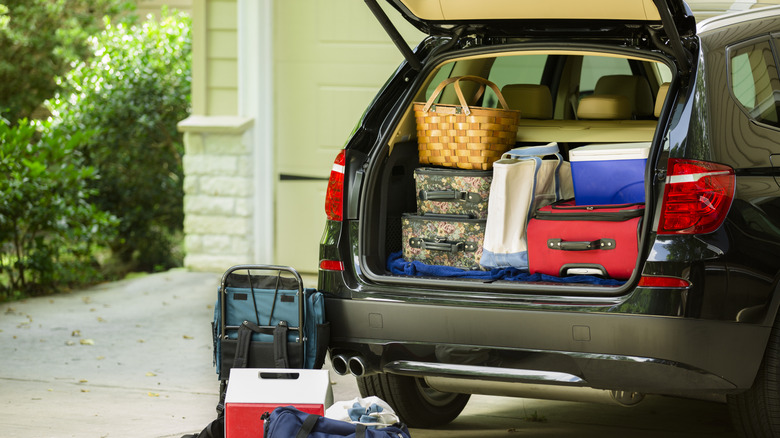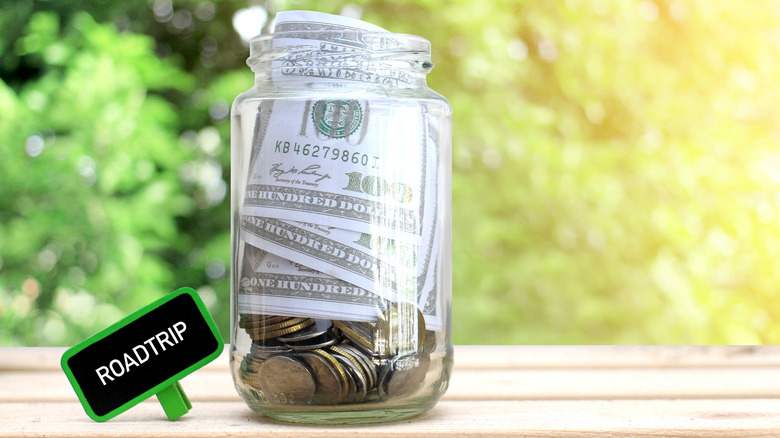Clever Packing Hacks For Your Next Long Road Trip
Hitting the road for an extended vacation is exciting business, but there is no denying the fact that there is a lot of planning involved to have the road trip of your dreams. From pit stops and side quests to car maintenance, directions, accommodations, and more, you definitely have your work cut out for you when it comes to road-tripping. But that doesn't mean you can't streamline the entire process. In fact, when you take the time to do your research and properly prepare, more often than not, road adventures are worth the extra trouble and have the potential to become some of your most beloved travel experiences.
Something as simple as packing for your holiday on the road the right way can make a world of difference. And even though you may be tempted just to throw everything you might need in the backseat or boot of the car since TSA is not looking over your shoulder — you shouldn't. Instead, utilize these clever packing hacks and tips for your next long road trip to ensure your car adventure goes according to plan.
Prep the car
Of course, before hitting the road, it is vital that you prep the car. If you are taking a rental car, make sure you learn the most cost-effective way to rent a car before pulling the trigger. However, if your main mode of transportation will be your own vehicle for this getaway, then a quick oil change and a maintenance once-over are undoubtedly essential. In addition to getting new filters, the necessary fluids(windshield washer fluid, coolant, brake fluid, and so on) topped off, and air in your tires, you should embark on your road vacation with a clean vehicle. This should include cleaning both inside and outside of the car — so do not forget to wipe down your front and rear windshields, side mirrors, and other areas that could impact your driving visibility.
Once the car is tuned up and thoroughly cleaned, do yourself a favor and also stock up on helpful items like napkins, hand sanitizer (or disinfecting wet wipes), air fresheners, and so on. Even if these kinds of incidentals are not high up on your to-do list — get them. You will be glad to have them on hand, especially when you have days of driving ahead of you and potential mess-makers in the car.
Pack light and wisely
When it comes to your personal belongings, it's always best to pack light and with your destination(s) in mind. That said, road trippers typically need more than just a suitcase for their getaway. In order to maximize available space for all your goods, you will want to consider reaching for soft-sided luggage instead of a hard case roller bag for your clothes and other items. A duffle bag, for instance, allows you to effortlessly pack in multiple people's stuff without taking up a ton of trunk space — leaving room for other road trip must-haves.
Inside your soft-sided travel gear, opting for comfort, functionality, and outfits that can easily go from day to night will make your time on the road more pleasant. Additionally, for your vacation essentials like toiletries, vitamins, an extra pair of sunglasses, a change of clothing, and more that you may want to quickly grab for a single night's stay or to freshen up, a smaller weekend tote is ideal. You may also want to put any valuables in this smaller to-go bag to keep them safe when leaving your vehicle packed and parked anywhere for extended periods of time or overnight.
Prepare for the unexpected
Yet another clever packing hack for your next long road trip is preparing for the unexpected. Since even the best laid plans may go awry, you need to ensure you are not caught off-guard. Here, one of the best ways to do just that is to purchase road trip insurance. From damaged belongings, severe weather, and possible medical emergencies, to accidents and cancellations, having trip insurance will come in handy.
Besides insurance, road trippers should also pack first aid and roadside emergency kits so nothing deters or ruins the adventure. Whether someone gets sick, has a headache, or simply needs a bandage for cuts and scrapes, having a first-aid kit in the car means you don't have to get off track for supplies. Most travel first-aid packs have over-the-counter medicines, bandages, gauze, first-aid tools, and more. When it comes to a roadside emergency kit, make sure you purchase one that is specific to your vehicle. This helps to ensure that any flat tires or minor repairs can be fixed in no time without the need for further aid. And, despite having all these things in tow, do not make the reckless road trip mistake of forgetting to let someone know back home where you're going and what your plans entail.
Utilize apps to the fullest
Though not technically a packing hack, loading up your mobile devices with road trip apps will make your life on the road a whole lot easier. Besides having access to driving directions, visitors' information for your potential pit stops, and being able to book tours and activities last minute, there is pretty much a travel app for everything. So, if you have not added the latest and greatest to your phone, then there is no time like the present.
That said, even though travel apps are literal lifesavers, it is important to make sure you have downloaded the right ones. For instance, if you have never checked out Roadtrippers Autopilot, then you might want to. Here, you can get tailored itineraries, traffic updates, and more. Of course, TripAdvisor is likely already on your device if you love to travel. But apps like Sygic Travel and DayPass also feature a wealth of detailed maps and tourist activities. Other useful apps to add to your phone include GasBuddy, HotelTonight, Google Maps, and Waze — just to name a few road trip approved ones.
Grab user-friendly car snacks and water
When it comes to stocking up the car, do yourself a favor and grab user-friendly snacks. Not only should you select mess-free items, but you should also try to keep them on the healthy side if possible. Road treats like jerky, popcorn, dried fruit, and trail mix are always good choices. Likewise, homemade sandwiches, muffins, carrots, and even grapes can easily tie everyone over until the next pit stop.
Snacks you know and love are also worth considering for the long road ahead, especially if you are not quite sure what your next destination will serve up. Plus, if you or your travel companions have any food allergies or dietary restrictions, familiar road trip snacks are a must to ensure there are no upset stomachs or medical emergencies. Besides bringing something to eat, you should have a few bottles of water with you. Even if you prefer to drink something other than regular water, you should always bring along some kind of water on a long road trip, just in case. Remember, staying hydrated during a long drive can help fight off fatigue, though if you do find yourself feeling sleepy, make sure to either pull off to the roadside for a nap or book a hotel. And if you decide to follow the popular road trip hack of sleeping in a parking lot overnight, make sure said parking lot is actually open 24 hours.
Consider a cooler
With some extra water on hand, you might want to consider packing a cooler. This way, you can keep a variety of drinks cold. What's more, any perishable food you have or pick up along the way can be stored in your car cooler. Having a place to stash your edible goodies will also limit the need for unnecessary stop-offs.
Figuring out if you want to load up the car with a standard cooler or a fancy electric cooler, however, is a whole other story. If you have an electric cooler already, then streamline your road trip experience and cross stopping for ice off your to-do list. Plus, without the need for ice, you can throw in a few more must-haves, thanks to all the extra space. On the other hand, for travelers who do not own an electric cooler and do not want to purchase one, your tried-and-true icebox can still be of service to you on the road. A hack to keep your food and drinks chill for longer in a soft or traditional cooler is to use dry ice — a warning here, however, is your items will likely end up frozen this way.
Have outdoor and camping gear handy
Even if you are planning on staying in various lodgings along the way, having a few camping essentials at your disposal can help keep things running smoothly. Much like packing a cooler, loading up the car with camping gear can improve your overall road adventure. For the campers who have every intention of enjoying a night under the stars in a national park somewhere, sleeping bags, pillows, window covers, and car trifold mattresses should be on your packing list.
In general, standard items like flashlights, camp chairs, blankets, cups, dishes, a multi-tool or sharp knife, and quick-dry towels are simply good to have with you. Of course, depending on your sleeping arrangements, you may also need to pack tents, fire starters, wash bags, bottle openers, bear spray, and a host of other campsite must-haves. But if you are not keen on the idea of camping in any of its forms, then having at least the outdoor basics should be more than sufficient.
Bring garbage bags and other life essentials
For extended getaways by car, bringing household goods like garbage bags and everyday essentials is a hack that will make spending all that time in your vehicle a breeze. Since garbage bags are multi-purpose, they can be used for trash, stockpiling recyclables, campsite cleanup, storing wet or dirty belongings, protecting items from the elements, and in the event that someone gets a little car sick. So do yourself a favor and get the garbage bags.
Other must-haves for the road include self-adhesive velcro strips, games, entertainment for the kids, bungee cords, pet gear, a comprehensive playlist, portable fans, toilet paper, and more. You can save so much travel time and money when you bring items that you regularly use, or that can be put to good use. To ensure that you do not forget these kinds of things and other life essentials, take the time to make a pre-departure or last-minute list that you can reference before hitting the road and double-check that you have everything you will need.
Have chargers, cords, and batteries on hand
When embarking on your road trip, your devices, phone, and other electronics must be fully charged. What's more, having the necessary means to recharge on the go is also just as important. So, you definitely want to grab those charging cords before you hit the road. Travelers should also consider investing in multi-charging cables, a portable phone charger, a universal charger, and charging phone cases — because the last thing you want on a long getaway is to find yourself without directions, tunes, or a working cellphone.
A solar-powered charging device is also a road trip must — just in case you go exploring and your portable one dies mid-hike. In addition to power banks, lightning chargers, and more, road trippers need to pack an assortment of batteries or rechargeable batteries. Whether it is for your flashlight, lantern, camera, or battery-operated hand warmers, you will be glad you brought spare batteries. And to make your life and passengers' lives a lot easier, you should consider getting a car organizer (over-the-seat, backseat, sun visor, or a stand alone), or a cord and cable organizing case for miscellaneous items.
Create a travel documents folder
One more great thing to pack away in a car or glove compartment organizer during a long road adventure is a travel document folder. Even in the age of apps and going green when it comes to most forms of documentation, having a printed copy of your itinerary, travel insurance, health insurance, registration, proof of insurance (or rental agreement), and more is a must. And keeping it all neatly tucked away in a folder when and if you need it just simplifies things for everyone in the car.
In your trusty documents folder, you may want to put other important papers as well, such as any information pertaining to health and safety, passports (if you are driving to other countries/crossing U.S. borders), medication lists, and roadside assistance numbers. You can also store confirmation numbers, printed tickets for activities, a paper map, and a variety of relevant road trip paperwork. Whatever it may be — having everything together in one well-organized place will definitely help to streamline your road trip.
Pack the car accordingly
Once you have the necessary items ready to go, it is time to load up the car. Since this will be a longer road adventure, you will likely have quite a bit of stuff to put in your vehicle. But before throwing the luggage in the trunk, it's highly recommended that you devise a packing system. Some road trippers load their vehicle up by zone, and others just want to make sure everything fits in the car.
Regardless of how you go about it, there are a few key points to keep in mind here. For instance, if you know you will need access to something frequently, like your hiking boots or toiletry bag, try to put them in last when packing up the car or in an easy-to-reach space. You also want to think about your stops — if you are packing for a breach trip.
Likewise, a quick overnight stay should not require unpacking and repacking the car. Road trippers should also take weight into account and place heavier items or bags on the bottom with lighter belongings stacked on top. And if you have a rooftop cargo box, utilize it for bulky but light items and outdoor gear (like for the tent or stroller). Pro tip: use seat organizers for kids and backseat passengers so they can easily keep track of their belongings while en route.
Carry cash and other travel must-haves
Last but definitely not least, you may not carry cash on you normally, but for a road trip, you'll need it. From tipping tour guides and hotel staff to paying for certain goods and services, there is a whole host of reasons why you should bring along some actual money. For example, even though most places accept credit or debit, what happens if you lose your card or it gets stolen? How will you pay for gas if the card reader is currently down and the ATM is out of service? Or, what if you are dying of thirst and the mom-and-pop stand you come across while hiking in some remote area only takes cash and not Apple Pay, Venmo, or Zelle?
Every traveler has been there before — you desperately need to pay for something, and you actually need cash. So, while you are utilizing the packing hacks mentioned above and diligently prepping for your next road trip, add money to your pre-departure list. Plus, if you are trying to stay on budget, some travelers swear by using cash as much as possible instead of swiping recklessly. It's worth noting that you still need to have a credit card or two on your person when you travel, as many accommodations, venues, and parking areas will only accept cards these days. Therefore, you should remember to bring both cash and credit cards so you are truly prepared for anything on your long-distance road trip.
